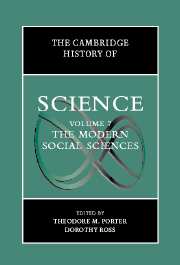Book contents
- Frontmatter
- 1 Introduction: Writing the History of Social Science
- PART I SCIENCES OF THE SOCIAL TO THE LATE NINETEENTH CENTURY
- PART II THE DISCIPLINES IN WESTERN EUROPE AND NORTH AMERICA SINCE ABOUT 1880
- PART III THE INTERNATIONALIZATION OF THE SOCIAL SCIENCES
- 22 The Sciences of Modernity in a Disparate World
- 23 The Social Sciences in Latin America during the Twentieth Century
- 24 Psychology in Russia and Central and Eastern Europe
- 25 Sociology in Egypt and Morocco
- 26 The Social Sciences in Africa
- 27 The Social Sciences in India
- 28 The Social Sciences In China
- 29 The Social Sciences in Japan
- PART IV SOCIAL SCIENCE AS DISCOURSE AND PRACTICE IN PUBLIC AND PRIVATE LIFE
- Index
- References
28 - The Social Sciences In China
from PART III - THE INTERNATIONALIZATION OF THE SOCIAL SCIENCES
Published online by Cambridge University Press: 28 March 2008
- Frontmatter
- 1 Introduction: Writing the History of Social Science
- PART I SCIENCES OF THE SOCIAL TO THE LATE NINETEENTH CENTURY
- PART II THE DISCIPLINES IN WESTERN EUROPE AND NORTH AMERICA SINCE ABOUT 1880
- PART III THE INTERNATIONALIZATION OF THE SOCIAL SCIENCES
- 22 The Sciences of Modernity in a Disparate World
- 23 The Social Sciences in Latin America during the Twentieth Century
- 24 Psychology in Russia and Central and Eastern Europe
- 25 Sociology in Egypt and Morocco
- 26 The Social Sciences in Africa
- 27 The Social Sciences in India
- 28 The Social Sciences In China
- 29 The Social Sciences in Japan
- PART IV SOCIAL SCIENCE AS DISCOURSE AND PRACTICE IN PUBLIC AND PRIVATE LIFE
- Index
- References
Summary
As academic disciplines, the social sciences are quite young in China, having been banned in the People’s Republic from 1952 until the early 1980s. At the same time, they trace back to an extensive tradition, especially the sociological research in China that, along with North America and Western Europe, formed a third flourishing center during the 1930s. During the period of its abolition, Chinese social science became a forgotten chapter in the international history of science. Social scientific study of China fell into oblivion not only because it was neglected for so long in China itself and because of language barriers, but also because of the self-reference of American and European research.
This chapter deals mainly with institutionalized social science in China, which, in a strict sense, includes also studies that do not deal specifically with China. It is concerned especially with what I will call “the Chinese social sciences,” referring to those approaches that aim to sinicize or indigenize the social sciences, as well as with approaches seen as a distinct “Chinese school” of social science. I emphasize specific aspects of this definition, and describe some central junctures in the development of the social sciences in China. The chapter starts with the native domains of learning of the Chinese scholars during the Qing Dynasty; it aims to describe these domains as the intellectual space that served as the framework for the reception of Western sciences as a new body of knowledge. The second section shows how a social space for scientific development was created after the abolition of the imperial examination system during the 1920s, and how sociology, economics, and political science became academic disciplines.
- Type
- Chapter
- Information
- The Cambridge History of Science , pp. 498 - 514Publisher: Cambridge University PressPrint publication year: 2003
References
- 4
- Cited by



